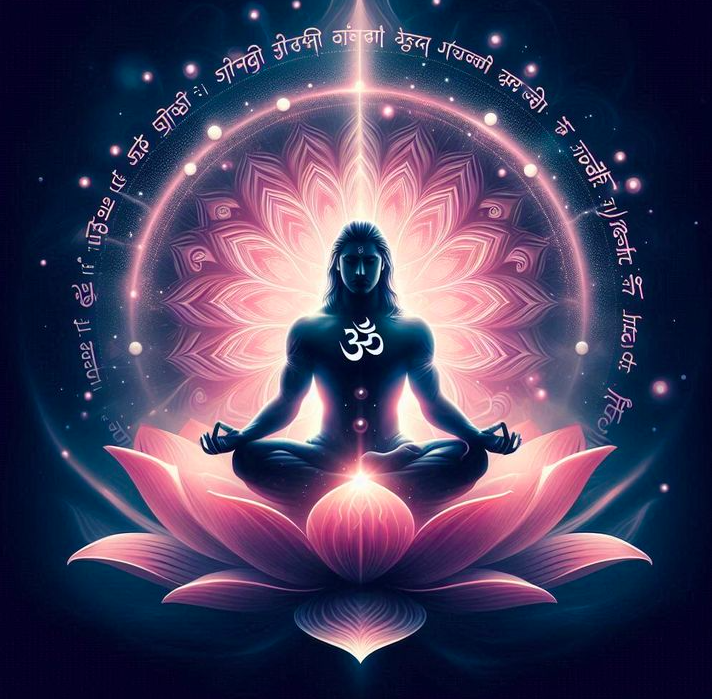The Question Behind All Questions
If “Who is God?” is the first doorway to spiritual inquiry, the second and perhaps deeper question is: Who am I?
We live entire lives identifying with names, roles, and stories. “I am a woman.” “I am a professional.” “I am a son, a daughter, a parent.” But Vedanta asks us to pause and see: Are these roles the essence of who you are or only masks worn by the Self?
The Two Selves: Ego vs. Atman
Vedanta makes a profound distinction:
- Ego (Ahamkara): The false self. The bundle of thoughts, labels, emotions, and stories we carry. It is temporary, changing, and bound by time.
- Atman: The true Self. Eternal, unchanging, the witness behind all experiences. It is not the body, not the mind, not even the intellect. It is pure consciousness.
The ego says: “I am this person with these problems and achievements.”
The Self whispers: “I am the awareness in which all of this comes and goes.”
A Simple Analogy: The Sky and the Clouds
Imagine the sky, vast, infinite, untouched. Now imagine clouds passing through, sometimes dark, sometimes bright, sometimes stormy. The ego is the cloud always changing, never permanent. The Self is the sky infinite, silent, never harmed by passing storms. Most of us mistake ourselves for the clouds. Vedanta reminds us: You are the sky.
Why Do We Mistake the Ego for the Self?
This confusion arises because of identification.
- You say, “I am sad” but sadness is a passing emotion.
- You say, “I am a failure” but failure is only a moment in time.
- You say, “I am a body” but the body is constantly changing, and one day, it will return to dust.
The Self, the Atman, never changes. But we identify with what changes, and therefore, we suffer. Vedanta calls this ignorance (avidya).
Self-Realization: Remembering What You Always Were
The Self cannot be “found” because it was never lost. It is not achieved through rituals or philosophies. It is recognized.
Self-realization is the moment you see clearly:
I am not the body. I am not the mind. I am not my stories.
I am the witness of them all. I am Atman — eternal awareness.
This realization is liberation (moksha). Not escape from life, but freedom within it.
Everyday Examples of the Self
- The Witness of Dreams:
Last night you dreamt of flying. You woke up. The dream ended. But the witness of the dream, awareness never ended. That awareness is your Self. - The Constant in Change:
As a child, you played with toys. As a teenager, you chased ambitions. As an adult, responsibilities. All of this changed. But the “I” that watched childhood, teenage, adulthood that never changed. That “I” is your Self. - The Silence Behind Music:
Music is beautiful because it arises in silence. In the same way, all your thoughts, emotions, and experiences arise in the silence of the Self.
The Union of God and Self
In Vedanta, to ask “Who is God?” and “Who am I?” is to ask the same question.
- God is Brahman infinite existence, consciousness, bliss.
- The Self is Atman the same infinite essence within you.
The mahāvākya declares:
“Ayam Ātmā Brahma” –The Self is Brahman.
This is the ultimate realization: you and God are not two.
Living From the Self
When you live as the ego, life feels like a constant struggle chasing, comparing, fearing. When you live as the Self, life feels like freedom because you are no longer seeking completeness; you are completeness.
This doesn’t mean renouncing the world. It means playing your roles as parent, friend, professional, creator without forgetting that behind it all, you are the infinite Self.
Conclusion: The Self Is Not to Be Reached, But Recognized
Vedanta doesn’t ask you to become something. It only asks you to see what you already are. The journey from ego to Atman is not movement in space it is awakening in awareness.
When you ask, “Who am I?” with sincerity, the answer doesn’t come in words. It comes in silence. In presence. In peace.
And in that silence, you recognize: I am Atman. I am That.
Reflection for Readers:
Tonight, when you sit quietly, notice the thoughts passing through. Instead of saying, “I am my thoughts,” notice the awareness watching them. Stay there. That awareness is the Self.


Leave a Reply